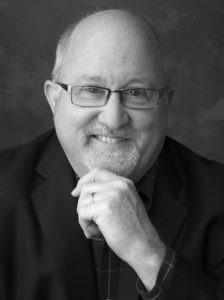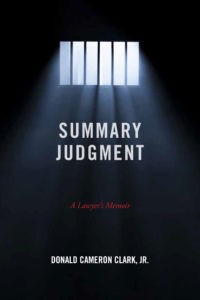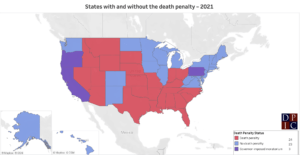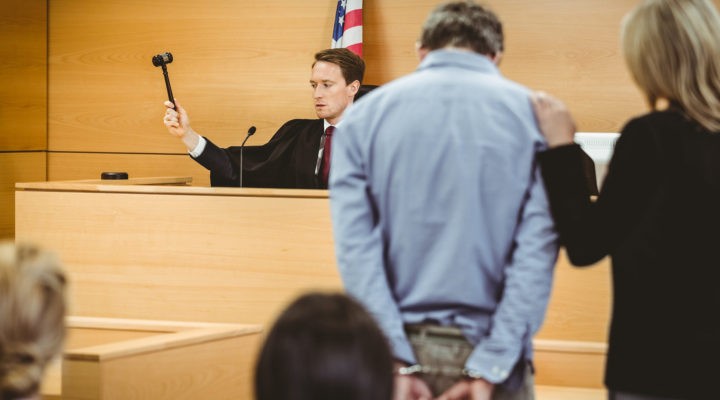Death penalty opponents must not shrink from challenging capital punishment even for those suspects factually guilty of committing heinous crimes, says attorney Donald Cameron Clark Jr.
“To defend against the death penalty is not to be dismissive of crime. It’s not to be callous toward victims,” said Clark, author of the new book Summary Judgment: A Lawyer’s Memoir.
Clark speaks from the experience gained representing a condemned murderer in Alabama for nearly a decade. And the book is, in part, an effort to push back against the stigma faced by defense attorneys, and sometimes even prosecutors and judges, involved in capital trials and appeals.

Donald Clark
“It’s not making an argument that individuals who commit these heinous crimes should not receive any punishment. It’s an argument that the death penalty does not advance any humanitarian causes and is therefore an act of retribution that is morally reprehensible,” said Clark, a former general counsel to the United Church of Christ and former interim president and current trustee of Chicago Theological Seminary.
Clark is making his case at a timely moment in U.S. capital punishment history. In January, Democrats in Congress introduced legislation to end the federal death penalty, a move in keeping with President Joe Biden’s campaign promise to ban the practice. A month later, Virginia became the 23rd U.S. state to abolish capital punishment.
The Chicago-based attorney is no stranger to taking on big cases in pivotal moments. Clark’s practice has centered on high-stakes trials and religious liberty cases, including fighting for the right of North Carolina clergy to officiate same-sex marriages.
But it was his work through the American Bar Association’s Death Penalty Representation Project that brough him into the life of Tommy Hamilton, who was sentenced to death in Alabama in 1985 for killing his boss.
 While Hamilton’s actual guilt was acknowledged, Clark said it was the legality of the trial that was successfully challenged by a team of attorneys that included himself and Sister Lynn McKenzie, a Catholic nun and lawyer who had been working to get Hamilton off death Row.
While Hamilton’s actual guilt was acknowledged, Clark said it was the legality of the trial that was successfully challenged by a team of attorneys that included himself and Sister Lynn McKenzie, a Catholic nun and lawyer who had been working to get Hamilton off death Row.
They were able to reverse the conviction by proving law enforcement had introduced “purchased and perjured testimony” into the trial, Clark said. It was a clear violation of the defendant’s constitutional right to a fair trial “whether guilty or not.”
It wasn’t Hamilton being defended so much as it was the law that should have governed his trial to begin with, Clark added. “You have to call into question whether this is a just approach to dealing with, and responding to, what are admittedly heinous criminal acts.”
But waging the legal battle wasn’t the only challenge during the Hamilton case, which brought with it significant social and financial pressures, he said. “There certainly is a stigma attached to defense counsel representing those accused of capital crimes, and certainly to those who have been convicted and sentenced.”
 Because those convicted of capital offenses are not entitled to state-appointed appellate attorneys, legal representation often is provided pro bono, Clark added. The financial consequences can be painful for some attorneys who engage in this work, “especially if you’re an attorney whose practice is not solely dedicated to defense work.”
Because those convicted of capital offenses are not entitled to state-appointed appellate attorneys, legal representation often is provided pro bono, Clark added. The financial consequences can be painful for some attorneys who engage in this work, “especially if you’re an attorney whose practice is not solely dedicated to defense work.”
It can be even harder on lawyers in rural communities and states where support for capital punishment is strong, Clark said. “I took the case because of the inability of the American Bar Association to find an Alabama attorney to represent Tommy Hamilton as lead counsel.”
The stress also applies to elected prosecutors and judges who can feel compelled by public opinion to pursue unwarranted death penalty cases, he said.
This all points to the fatal flaws in the death penalty system in which revenge often becomes the motivating factor for trial and sentencing. “That is just something I believe that cannot be morally justified,” Clark explained.
Just as wrong is the fact that the death penalty is disproportionately applied along the lines of race, income and education levels.
And then there is the issue of wrongful convictions. Clark fully supports innocence projects, given the number of exonerations of those falsely or inaccurately accused.
“Defending the factually guilty is also an important part of justice work.”
But getting the innocent off death row isn’t the only form that death penalty opposition should take, he contends. “I believe that is important work. But I don’t believe the conviction of innocent persons is the only possible flaw in a criminal justice system. Defending the factually guilty is also an important part of justice work.”
Those thirsty for vengeance against convicted killers could take comfort in knowing that many condemned prisoners would rather be executed than live for years in prison.
“I can say from my experience with Tommy that he feared life imprisonment more than he feared electrocution. He made it clear to us from day one that he feared death by incarceration more than anything.”
Related articles:
Final vote sounds the death knell for capital punishment in Virginia
The death penalty is dying a slow death; it’s time we pull the plug
New effort to repeal federal death penalty is beginning
Opposition to capital punishment reportedly growing among conservatives


